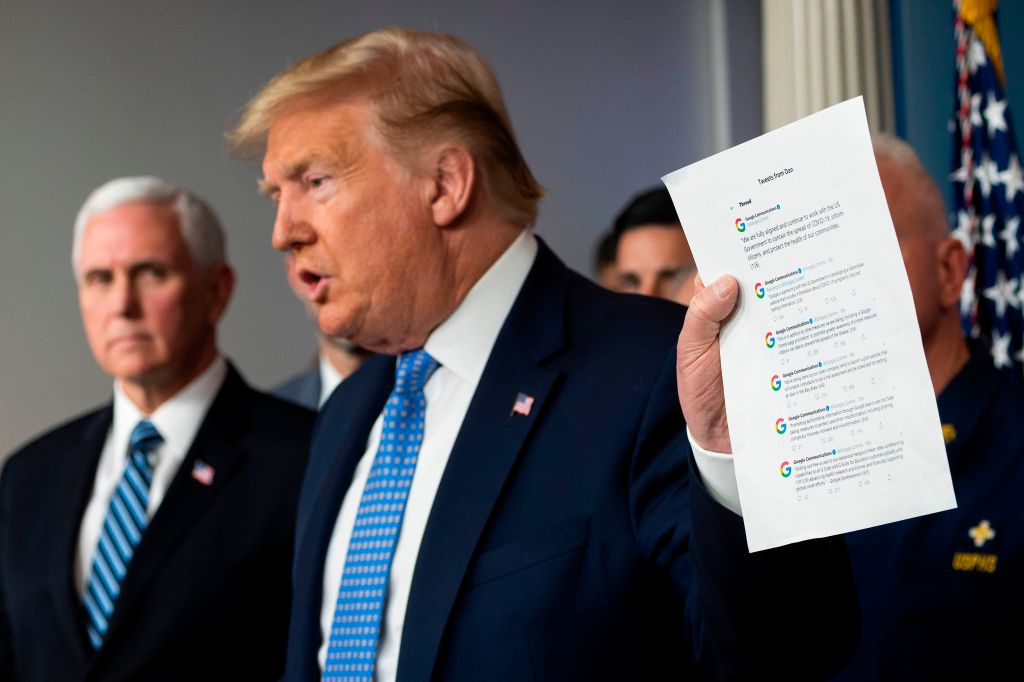At what is now a daily coronavirus press briefing at the White House, President Trump today said that Google CEO Sundar Pichai called him to apologize. What Pichai apologized for wasn’t immediately clear, but Trump then went on to praise Google’s communications team for supposedly substantiating Trump’s comments about Google’s coronavirus screening site.
“I want to thank the people at Google and Google Communications because as you know, they substantiated what I said on Friday,” said Trump. “The head of Google, who is a great gentleman — said — called us — and apologized. I don’t know where the press got their fake news, but they got it someplace. As you know, this is from Google [holds up printout of Google Communication’s statement on Twitter]. They put out a release [drops the paper on the ground] and you guys can figure it out yourselves and how that got out, and I’m sure you’ll apologize. But it would be great if we could really give the news correctly. It would be so, so wonderful.”
We reached out to both Google and the White House for further clarification about this call. Update (4:20pm PT): Google says it doesn’t have anything to share about this call.
What is clear, though, is that Google and Alphabet CEO Pichai today posted an update to Google’s blog that outlines Google’s efforts. In it, Pichai clears up some of the confusion and describes the work the company is doing to get more information about the virus and COVID-19 to its users, as well as the work Alphabet’s Verily life sciences unit is doing to build a screening site for the Bay Area (and potentially for a nationwide rollout).
On Friday, Trump said 1,700 Google engineers were working on this screening site — though it is a Verily project that, as best we can tell, was never meant for a consumer rollout. Google never clarified how many people were working on its efforts, but it doesn’t take 1,700 engineers to build the site Trump described.
Here is what Trump said on Friday:
“I want to thank Google. Google is helping to develop a website. It’s gonna be very quickly done — unlike websites of the past — to determine whether a test is warranted and to facilitate testing at a nearby convenient location. We have many, many locations behind us, by the way. We cover this country and large parts of the world, by the way. We’re not gonna be talking about the world right now, but we cover very, very strongly our country. Stores in virtually every location. Google has 1,700 engineers working on this right now. They have made tremendous progress.”
The Fake and Corrupt News never called Google. They said this was not true. Even in times such as these, they are not truthful. Watch for their apology, it won’t happen. More importantly, thank you to Google! https://t.co/AuvpbXNouW
— Donald J. Trump (@realDonaldTrump) March 15, 2020
Google was clearly not ready for this public statement at the time. On Friday, we contacted them a few minutes after Trump made these comments. (Trump today said the media never called Google, which was flat-out wrong.) It took Google’s Verily unit almost two hours to respond and note that Verily was working on a far more limited project than the one Trump described.
Despite Trump’s claims, Google isn’t building the coronavirus screening site — and it’s not ready
On Saturday, VP Pence clarified the situation a bit by saying that Google (or Verily – because who knows at this point) would have a pilot version of the screening site ready for a test in the Bay Area by tomorrow, Monday the 16th.
“I know Google issued a statement that they are planning to launch a website,” Pence said. “I think they gave a date of Monday, March 16th and we’re working literally around the clock and I know that our whole team is working on the public and private partnership. Couldn’t be more grateful to all at the hard-working people at Google who are helping to put this website together.”
But what Google later clarified is that there are at least two different efforts here. Google’s work around bringing more information about COVID-19 to its users across its various services — and Verily’s efforts to launch a pilot website “that will enable individuals to do a risk assessment and be scheduled for testing at sites in the Bay Area.”
White House now says pilot of coronavirus screening site will roll out Monday for Bay Area
Today, to add a bit more confusion to this story, VP Pence said the government is working with “Google and many other tech companies,” including Google, Facebook and Amazon. At some point early in the week, there will be a website that will go up where people can fill out a questionnaire to see if they need a test. That is very much the site Trump described on Friday, but Pence didn’t clarify how much of a role Google is playing in this.
On Friday, Trump promised a nationwide website, developed by Google, that would be at the core of the government’s screening process. Google wasn’t ready for that announcement. The site didn’t exist yet. Even the limited version of that site, which wasn’t developed by Google, was ready and for the most part, a lot of us in the media probably now regret ever taking the president at his word. As of now, this is one of the most bizarre Google stories I’ve covered in recent years.
Now, it’d be great to hear more about what Pichai apologized for.
































Comment